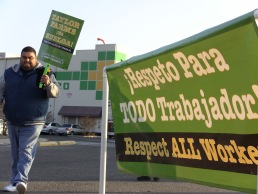Low-Wage Movement Strikes Food Processing at Taylor Farms
Turning a New Leaf for Worker Justice
Published at CounterPunch.
It was still dark as Julian Camacho flagged down workers driving in for their shift. One by one, he handed them a leaflet while dozens of picketers crisscrossed the parking lot entrance, chanting in the morning chill before the sun rose over Tracy, California.
Julian knows these people. He used to work alongside them – cutting, washing, packaging, and loading salads and other food for Taylor Farms, the largest supplier of fresh-cut produce in the country.
But when Julian became involved in a campaign to organize a union at his plant, the company fired him.
“I was fired after four years of working at Taylor Farms,” he said. “We have the right to stand up and organize for better working conditions, but Taylor Farms clearly does not respect that and it doesn’t respect its workers – they just want to silence us.”
Julian isn’t alone. He joined hundreds of other workers and supporters for a one-day strike against unfair labor practices on December 19. Like Julian, two other workers have been terminated for their union support. Among the workers at the company’s two plants in Tracy, a large majority have signed union cards. They say they deserve more than poverty wages and the mistreatment that management inflicts on its workforce. Read the rest of this entry
DC Mayor Vetoes Living-Wage Bill, Endorses Walmart Poverty Wages
 Walmart won another battle in its war on workers this morning as Washington, DC Mayor Vincent Gray vetoed the Large Retailer Accountability Act. With Walmart planning its entry into the DC market, the legislation would require the company and other big-box retailers to pay a minimum of $12.50 an hour in wages and benefits.
Walmart won another battle in its war on workers this morning as Washington, DC Mayor Vincent Gray vetoed the Large Retailer Accountability Act. With Walmart planning its entry into the DC market, the legislation would require the company and other big-box retailers to pay a minimum of $12.50 an hour in wages and benefits.
The debate over the bill, the Large Retailer Accountability Act, has polarized local leaders while garnering national attention and putting focus on the low wages many retail chains pay their workers.
But Gray made no secret in recent months that, for him, jobs and retail took priority.
Wal-Mart’s entry into the city was an early political coup for Gray, and he personally lobbied — some say threatened — top company executives to commit to a store at the Skyland Town Center development not far from Gray’s home in Ward 7.
The Skyland store is among those Wal-Mart has threatened to abandon should the living-wage bill become law.
Gray – who has previously received widespread support from the local labor movement – has been happy to promote Walmart’s narrative of jobs versus living wages. Before the city council surprised everyone by voting in favor of the bill earlier this summer, Walmart tried to blackmail the city by threatening to cancel building three of the six new stores planned for DC.
Sure enough, in announcing his veto Gray pretended to be a supporter of living wages in general while calling the LRAA a “job-killer.”
So much for standing up to Walmart’s bullying. And so much for bucking the national trend in which the only significant job growth is happening in low-wage industries. Read the rest of this entry
Retail Rebellion
Reinventing Organized Labor in the Walmart Economy
January 15, 2013
First published at The Neoprogressive. Also published at Counterpunch and Common Dreams.
In 1962, Arkansas businessman Sam Walton opened the first Walmart discount store, setting in motion the rapid ascendance of a corporate giant that would redefine markets around the world. With its focus on competitive prices and vast distribution networks that revolutionized the industry, Walmart grew over the course of the 20th century to become the world’s largest company.
Today, its retail empire covers 15 countries with over 8,900 stores employing 2.2 million people. Like all empires, its success is built on contradictions and exploitation. Read the rest of this entry
Labor Needs a Different Kind of “Ground Game”
November 20, 2012
Published at Common Dreams and CounterPunch.
After suffering almost two years of ramped up union-busting, the labor movement came out swinging in the recent elections. It swung its hardest in swing states like Ohio, delivering the 2012 presidential election to President Obama and propelling other labor-endorsed candidates to office.
 Labor’s decisive role in reelecting Obama and boosting dozens of other Democrats in key races was acknowledged in the national press. And it was acknowledged by labor. Read the rest of this entry
Labor’s decisive role in reelecting Obama and boosting dozens of other Democrats in key races was acknowledged in the national press. And it was acknowledged by labor. Read the rest of this entry
Decision 2012: Austerity vs. Austerity
November 6, 2012
As this year’s election finally reaches its conclusion, working-class people will soon know who will drive the agenda of austerity over the next four years. Whether it’s Obama or Romney, the underlying priorities remain the same, and at the center of those priorities is a commitment to cut the deficit on the backs of workers and the poor.
Up to this point, the campaigning on either side has sought to lead voters into a state of mind in which substance and style bleed together as one. Because beyond style, both Obama and Romney share more in common on policy than they disagree. Even if Democrats and Republicans differ on how to get there, the goal is the same: safeguard the dominance of corporate power and point to the deficit as reason enough to march forward with the assault on the working class. Read the rest of this entry
Winning the Strike: How Chicago Teachers Made History
October 1, 2012
Last month, the Chicago Teachers Union did something that no one thought possible a few years ago when the Great Recession took hold. Back then, the economic crisis and devastating budget cuts gave corporate-backed school “reformers” the conditions they needed to thrust the war on public education into high gear.
The Chicago teachers strike is a groundbreaking event in the fight to defend public schools and resurrect a fighting labor movement. Months of preperation went into the victorious strike that forced Mayor Rahm Emanuel to back down from his most damaging attacks against teachers. The union knew it needed to build alliances beyond labor and win the support of parents and communities before moving to strike. Its success in doing so was central to winning the standoff. Read the rest of this entry








